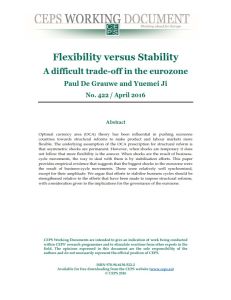Join getAbstract to access the summary!

Join getAbstract to access the summary!
Paul De Grauwe and Yuemei Ji
Flexibility versus Stability
A Difficult Trade-Off in the Eurozone
CEPS, 2016
What's inside?
The approach to solving the euro zone’s economic problems may be all wrong.
Recommendation
The euro zone faces considerable economic and monetary pressures as the bloc recovers from the lingering effects of the financial and sovereign debt crises. European Union policy makers have exhorted struggling euro members to implement structural reforms in labor and product markets, according to the prescriptions of the economic theory on optimal currency areas. However, economists Paul De Grauwe and Yuemei Ji argue that those prescriptions may not apply to the economic and fiscal issues facing the euro zone. getAbstract recommends this timely and astute analysis of European policy options to economists, policy makers and analysts.
Summary
About the Authors
Paul de Grauwe is a professor of international economics at the London School of Economics. Yuemei Ji is a lecturer at University College London.




















Comment on this summary